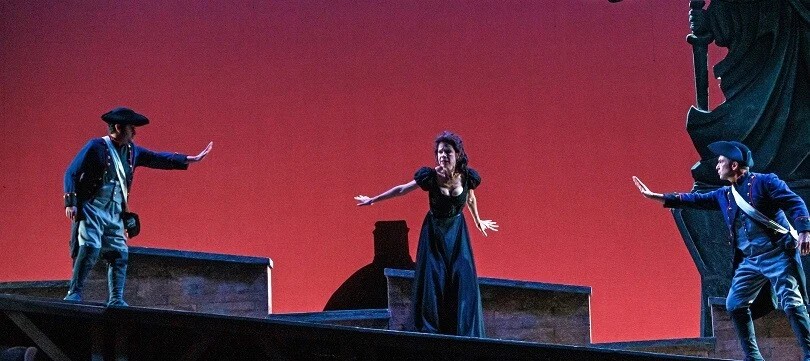ACT I. Cesare Angelotti, an escaped political prisoner, rushes into the church of Sant'Andrea della Valle to hide in the Attavanti chapel. As he vanishes, a Sacristan shuffles in, praying at the sound of the Angelus. Mario Cavaradossi enters to work on his portrait of Mary Magdalene, inspired by the Marchesa Attavanti (Angelotti's sister). Looking at the portrait, he compares her blond beauty to that of his raven-haired lover, the singer Floria Tosca (“Recondita armonia”). The Sacristan grumbles disapproval and leaves. Angelotti emerges and is recognized by his friend and fellow liberal Mario, who gives him food and hurries him back into the chapel as Tosca is heard calling outside. Tosca asks suspiciously why the doors to the church were locked and then reminds him of their rendezvous that evening at his villa (“Non la sospiri la nostra casetta?”). Suddenly recognizing the Marchesa Attavanti in the painting, Tosca is instantly jealous, but Mario reassures her (“Qual’ occhio al mondo”). When she has gone, Mario summons Angelotti from the chapel; a cannon signals that the police have discovered the escape, so the two flee to Mario's villa. Meanwhile, the Sacristan returns with the choir that is to sing a Te Deum that day. Their excitement is silenced by the entrance of Baron Scarpia, chief of the secret police, in search of Angelotti. When Tosca returns, Scarpia shows her a fan he has just found, bearing the Attavanti crest. Thinking Mario faithless, Tosca tearfully vows vengeance and leaves as the church fills with worshipers. Scarpia, sending his men to follow her to Angelotti, schemes to get the diva in his power (“Va, Tosca!”).
ACT II. In the Farnese Palace, Scarpia anticipates the sadistic pleasure of bending Tosca to his will (“Ha più forte sapore”). The spy Spoletta arrives. He has not found Angelotti, but has arrested Mario, who is brought in for Scarpia to interrogate while Tosca is heard singing a cantata at a royal gala downstairs. She enters just as her lover is being taken to an adjoining room; he will be forced to confess under torture. Unnerved by Scarpia's questioning and the sound of Mario's screams, Tosca reveals Angelotti's hiding place. Mario is brought in; realizing what has happened, he turns on her, but Sciarrone rushes in to announce that Napoleon has won the Battle of Marengo, a defeat for Scarpia's side. Mario shouts his defiance of tyranny (“Vittoria!”) and is dragged to prison. Scarpia now suggests that Tosca yield herself to him in exchange for her lover's life. Fighting off his embraces, she protests her fate to God, having dedicated her life to art and love (“Vissi d’arte”). Scarpia again insists, but Spoletta interrupts: faced with capture, Angelotti has killed himself. Tosca, forced to give in or lose her lover, agrees to Scarpia's proposition. The baron pretends to order a mock execution for Mario, after which he is to be freed; Spoletta leaves. No sooner has Scarpia written a safe-conduct document for the lovers than Tosca snatches a knife from the table and kills him, then wrenches the safe-conduct pass from the dead man’s hand.
ACT III. The voice of a shepherd boy is heard as church bells toll at dawn. Mario awaits execution at the Castel Sant'Angelo; he bribes the jailer to convey a farewell note to Tosca. Writing it, overcome with memories of love, he gives way to despair (“E lucevan le stelle”). Suddenly Tosca arrives, filled with the story of her recent adventures. Mario caresses the hands that committed murder for his sake, and the two hail their future. As the firing squad appears, the diva coaches Mario on how to fake his death convincingly; the soldiers fire and depart. Tosca urges Mario to hurry, but when he fails to move, she discovers that Scarpia's treachery has transcended the grave—the bullets were real. When Spoletta rushes in to arrest Tosca for Scarpia's murder, she cries to Scarpia to meet her before God, then leaps to her death.
~Adapted from Opera News





 Performance Dates/Times/Location
Performance Dates/Times/Location











